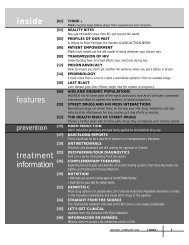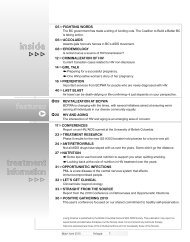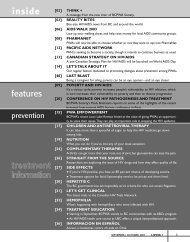iv poz mag.qxd - Positive Living BC
iv poz mag.qxd - Positive Living BC
iv poz mag.qxd - Positive Living BC
Create successful ePaper yourself
Turn your PDF publications into a flip-book with our unique Google optimized e-Paper software.
issue 50.<strong>qxd</strong>:l<strong>iv</strong> <strong>poz</strong> <strong>mag</strong>.<strong>qxd</strong> 9/3/07 4:04 PM Page 35<br />
posit<strong>iv</strong>e people, especially those on protease inhibitor therapy,<br />
are at an elevated risk for glucose-related problems. According to<br />
research, you can reduce your likelihood of developing kidney<br />
disease by 50 percent by maintaining tight control of your<br />
glucose levels. Your doctor can help you regulate your blood<br />
pressure and glucose levels.<br />
Get screened right away<br />
To address kidney health and to maximize your HIV treatment,<br />
experts recommend that you get screened for kidney disease<br />
soon after being diagnosed with HIV. HIV-associated nephropathy<br />
(HIVAN) occurs when HIV enters the kidneys, multiplies, and<br />
then wears away and da<strong>mag</strong>es the nephrons. Of all the diseases<br />
that attack the nephrons, HIVAN is believed to be the most<br />
serious. If left untreated, kidney failure can occur within six to<br />
12 months.<br />
Although scientists don’t know exactly how many HIVposit<strong>iv</strong>e<br />
people have HIVAN, research shows that HIVAN is<br />
more prevalent among men, people of African descent, and<br />
those with a history of intravenous drug use. Low CD4 counts<br />
and hereditary renal disease also place people at a heightened<br />
risk for developing HIVAN.<br />
According to the Infectious<br />
Disease Society of America,<br />
up to 30 percent of people<br />
l<strong>iv</strong>ing with HIV suffer from<br />
abnormal renal function.<br />
The bottom line is that HIV infection can cause kidney<br />
problems, which can become serious. Since kidney problems<br />
may be asymptomatic, get your urine checked regularly for any<br />
signs of trouble. Also, if you have kidney problems, you may<br />
need to lower the amount of some antiretrovirals you’re taking.<br />
With early screening and the aid of your doctor, you can<br />
maintain your kidney health. 5<br />
Audrey Le is a researcher/writer for <strong>BC</strong>PWA.<br />
SeptemberqOctober 2007 l<strong>iv</strong>ing5 35











